28 start with L start with L

Students of Spanish language and culture can now benefit from a text that provides them with an understanding of contemporary Spanish history and society while refining their knowledge of the language and expanding their vocabulary.
La España que sobrevive (originally published in Madrid in 1987) explores the aftermath of the Franco era in Spain. It presents an objective and nonpartisan, yet humorous and affectionate, view of the important aspects of contemporary Spanish history and society. Topics include the transition to democracy; regionalism and nationalism; key players in current affairs; important institutions such as the monarchy, military, and the church; sexual mores; culture; the media; and politicized approaches to Spanish history.
For this edition, William W. Cressey has edited Fernando Díaz-Plaja's text to make it accessible to English-speaking students at an advanced level of Spanish reading skills. Cressey has also added study aids to the book—vocabulary and footnotes, glosses on proper names, questions for discussion, notes on grammar and rhetoric, and exercises. The study aids are gradually phased out, so that the final chapter is presented as stand-alone reading without any supplementary materials.
Cressey's adaptation of Díaz-Plaja's highly respected work provides an alternative to literary sources for foreign language instruction—a new resource for teaching foreign languages across the curriculum and instruction through content. Bridging the gap between the fairly simple intermediate readers and texts written for adult native speakers, this book can serve as either a supplementary or main text in the advanced study of language or history, or in preparation for study abroad. La España que sobrevive is a practical tool for teaching not only the language but also the many facets of modern Spanish culture.

Bridging the gap between theoretical linguistics and language teaching, Judith R. Strozer explores what recent theoretical advances suggest about learning a language after childhood and the implications for the design and execution of a foreign language program. Strozer outlines clearly, in nontechnical language, the major concepts of modern language theory, from Chomsky's theory of language through the most recent discoveries about the abstract foundations of language. She explains ideas about the evolution of a cognitive structure for language in the human brain, a "language faculty" or Universal Grammar that gives humans alone the creative ability to generate the infinite expressions of language. This innate universal schema for language endows humankind with a number a very broad principles applicable to all languages.
Turning to current advances in the theory of phrase structure, which has replaced our 2,000-year-old rules of grammar with highly abstract universal principles of language structure, she relates the latest discoveries about the foundations of language to ideas about how children learn languages. A child hearing a specific language can automatically set the parameters for the rules governing that particular language, much like setting a binary switch. But our ability to access this innate language mechanism automatically seems limited to childhood, until physical maturity somehow changes this brain function.
Arguing that adults need to learn consciously the systems and structures of another language that children acquire unconsciously, Strozer applies these latest theories about the nature of language and how we learn it to the design of foreign language programs for adults. She concludes with recommendations for developing a new kind of teaching program that would draw on comparative language research and include new pedagogic approaches.
Presenting state-of-the-art language theory in easily readable terms and illustrative examples, this book will be of interest to everyone interested in the latest understanding of the relationship between the brain and language, as well as to all professionals in linguistics and language education.

On the Flathead Reservation in northwestern Montana, the sixty remaining fluent speakers of Montana Salish, most of them elderly, speak their language only to each other, changing to English when outsiders or younger tribal members are present. The Aleuts who used to live on Bering Island off the east coast of Russia speak Russian in addition to their native Aleut. The Republic of Singapore, an island nation of just 238 square miles, boasts four official languages. Language contact is everywhere: no nation has a completely monolingual citizenry and many have more than one official language.
Sarah G. Thomason documents the linguistic consequences of language contacts worldwide. Surveying situations in which language contact arises, she focuses on what happens to the languages themselves: sometimes nothing, sometimes the incorporation of new words, sometimes the spread of new sounds and sentence structures across many languages and wide swathes of territory. She outlines the origins and results of contact-induced language change, extreme language mixture—which can produce pidgins, creoles, and bilingual mixed languages—and language death. The book concludes with a brief survey of language endangerment.
Complete with lists of additional readings and references as well as a glossary for students new to the subject, this textbook is a richly documented introduction to a lively, fast-developing field.

In the United States today there is lively discussion, both among educators and employers, about the best way to prepare students with high-level language and cross-cultural communication proficiency that will serve them both professionally and personally in the global environment of the twenty-first century. At the same time, courses in business language and medical language have become more popular among students. Language for Specific Purposes (LSP), which encompasses these kinds of courses, responds to this discussion and provides curricular models for language programs that build practical language skills specific to a profession or field. Contributions in the book reinforce those models with national survey results, demonstrating the demand for and benefits of LSP instruction.
With ten original research-based chapters, this volume will be of interest to high school and university language educators, program directors, linguists, and anyone looking to design LSP courses or programs in any world language.

Language in Use creatively brings together, for the first time, perspectives from cognitive linguistics, language acquisition, discourse analysis, and linguistic anthropology. The physical distance between nations and continents, and the boundaries between different theories and subfields within linguistics have made it difficult to recognize the possibilities of how research from each of these fields can challenge, inform, and enrich the others. This book aims to make those boundaries more transparent and encourages more collaborative research.
The unifying theme is studying how language is used in context and explores how language is shaped by the nature of human cognition and social-cultural activity. Language in Use examines language processing and first language learning and illuminates the insights that discourse and usage-based models provide in issues of second language learning. Using a diverse array of methodologies, it examines how speakers employ various discourse-level resources to structure interaction and create meaning. Finally, it addresses issues of language use and creation of social identity.
Unique in approach and wide-ranging in application, the contributions in this volume place emphasis on the analysis of actual discourse and the insights that analyses of such data bring to language learning as well as how language shapes and reflects social identity—making it an invaluable addition to the library of anyone interested in cutting-edge linguistics.

Language, Mind and Brain is a delightfully readable, yet erudite exploration of how the human mind processes and orders sounds and words into meaning. It explores how properties of the human mind/brain constrain linguistic structure and how linguistics can benefit by combining traditional linguistic methodologies with insights from research on language acquisition, processing, and impairment. The first part of the book offers a useful introduction to the relevant issues for readers with little prior knowledge of these disciplines; part two addresses such key issues as the status of rules, the relationship between grammar and the lexicon, and the relationship between innate structure and acquired knowledge. Fascinating for anyone interested in the intricacies of how language is acquired and how the brain sorts sounds into communication.
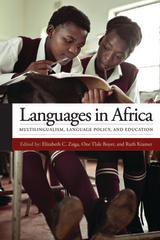
People in many African communities live within a series of concentric circles when it comes to language. In a small group, a speaker uses an often unwritten and endangered mother tongue that is rarely used in school. A national indigenous language—written, widespread, sometimes used in school—surrounds it. An international language like French or English, a vestige of colonialism, carries prestige, is used in higher education, and promises mobility—and yet it will not be well known by its users.
The essays in Languages in Africa explore the layers of African multilingualism as they affect language policy and education. Through case studies ranging across the continent, the contributors consider multilingualism in the classroom as well as in domains ranging from music and film to politics and figurative language. The contributors report on the widespread devaluing and even death of indigenous languages. They also investigate how poor teacher training leads to language-related failures in education. At the same time, they demonstrate that education in a mother tongue can work, linguists can use their expertise to provoke changes in language policies, and linguistic creativity thrives in these multilingual communities.

While the American legal system has played an important role in shaping the field of bioethics, Law and Bioethics is the first book on the subject designed to be accessible to readers with little or no legal background. Detailing how the legal analysis of an issue in bioethics often differs from the "ethical" analysis, the book covers such topics as abortion, surrogacy, cloning, informed consent, malpractice, refusal of care, and organ transplantation.
Structured like a legal casebook, Law and Bioethics includes the text of almost all the landmark cases that have shaped bioethics. Jerry Menikoff offers commentary on each of these cases, as well as a lucid introduction to the U.S. legal system, explaining federalism and underlying common law concepts. Students and professionals in medicine and public health, as well as specialists in bioethics, will find the book a valuable resource.

From birth certificates and marriage licenses to food safety regulations and speed limits, law shapes nearly every moment of our lives. Ubiquitous and ambivalent, the law is charged with both maintaining social order and protecting individual freedom. In this book, Cynthia L. Cates and Wayne V. McIntosh explore this ambivalence and document the complex relationship between the web of law and everyday life.
They consider the forms and functions of the law, charting the American legal structure and judicial process, and explaining key legal roles. They then detail how it influences the development of individual identity and human relationships at every stage of our life cycle, from conception to the grave. The authors also use the word "web" in its technological sense, providing a section at the end of each chapter that directs students to relevant and useful Internet sites.
Written for upper-level undergraduate and graduate students in law and society courses, Law and the Web of Society contains original research that also makes it useful to scholars. In daring to ask difficult questions such as "When does life begin?" and "Where does law begin?" this book will stimulate thought and debate even as it presents practical answers.
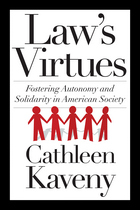
Can the law promote moral values even in pluralistic societies such as the United States? Drawing upon important federal legislation such as the Americans with Disabilities Act, legal scholar and moral theologian Cathleen Kaveny argues that it can. In conversation with thinkers as diverse as Thomas Aquinas, Pope John Paul II, and Joseph Raz, she argues that the law rightly promotes the values of autonomy and solidarity. At the same time, she cautions that wise lawmakers will not enact mandates that are too far out of step with the lived moral values of the actual community.
According to Kaveny, the law is best understood as a moral teacher encouraging people to act virtuously, rather than a police officer requiring them to do so. In Law’s Virtues Kaveny expertly applies this theoretical framework to the controversial moral-legal issues of abortion, genetics, and euthanasia. In addition, she proposes a moral analysis of the act of voting, in dialogue with the election guides issued by the US bishops. Moving beyond the culture wars, this bold and provocative volume proposes a vision of the relationship of law and morality that is realistic without being relativistic and optimistic without being utopian.

Kazakh, a Turkic language that uses Cyrillic script, is the official state language of Kazakhstan and is also spoken by people in parts of China, Russia, and neighboring Central Asian countries. This unique learner’s dictionary features simple definitions, literal translations, English equivalents, full example sentences, and grammar and usage for over 2,000 Kazakh idioms.
As students progress to the upper-intermediate and advanced levels of language learning, they come in contact with cultural concepts embedded in simple words that they have learned as part of everyday vocabulary. Thus, they expand their vocabulary into idiomatic expressions. Upper-intermediate and advanced learners of Kazakh will find this extensive reference work useful to understand those culturally bound idioms.
Idioms in this reference volume are organized into categories—the human body, food, clothing, color, number, animals, and nature—that best represent the topics on which language learners focus at the beginning and intermediate levels of language study. Five indexes make finding the idiom you want—by idiom, keyword, or expression in both Kazakh and English—easier.

Learning French from Spanish and Spanish from French provides adult English speakers who have learned either Spanish or French as a second language with the tools to learn the other as a third language. Research in the growing fields of third-language acquisition and multilingualism documents how successful language learners intuitively build on their existing knowledge as they learn a new language. In this vein, Learning French from Spanish and Spanish from French takes advantage of the fact that learners with intermediate proficiency in a second language are used to thinking consciously about language, know themselves as language learners, and can capitalize on what they know about one language to understand the other. With chapters conveniently organized by grammatical concept and including supplementary resources such as exercises, parallel reading texts, and audio files, this book will benefit students, travelers, and budding multilinguals alike.

Identifying “lessons learned” is not new—the military has been doing it for decades. However, members of the worldwide intelligence community have been slow to extract wider lessons gathered from the past and apply them to contemporary challenges. Learning from the Secret Past is a collection of ten carefully selected cases from post-World War II British intelligence history. Some of the cases include the Malayan Emergency, the Cuban Missile Crisis, Northern Ireland, and the lead up to the Iraq War. Each case, accompanied by authentic documents, illuminates important lessons that today's intelligence officers and policymakers—in Britain and elsewhere—should heed.
Written by former and current intelligence officers, high-ranking government officials, and scholars, the case studies in this book detail intelligence successes and failures, discuss effective structuring of the intelligence community, examine the effective use of intelligence in counterinsurgency, explore the ethical dilemmas and practical gains of interrogation, and highlight the value of human intelligence and the dangers of the politicization of intelligence. The lessons learned from this book stress the value of past experience and point the way toward running effective intelligence agencies in a democratic society.
Scholars and professionals worldwide who specialize in intelligence, defense and security studies, and international relations will find this book to be extremely valuable.

Lee Kuan Yew, Singapore's first prime minister (from 1959 to1990), has been an international figure not only for establishing Singapore's political and economic stability but also for fostering economic development throughout Asia. He is particularly renowned as a principle architect of the 'Asian values' campaign of the 1990s, which sought to preserve the undemocratic traits of Asian culture while attending to the demands of a capitalist economy operating globally.
A critical examination of Lee's life, career, and ideas, this is the first book to analyze the origins and substance of Lee's political thought. Augmenting established primary sources with his own interviews and correspondence with Lee's old associates, Barr shows how Lee has been influenced by British and Chinese racism and elitism, western progressivism, and even the cultural evolutionism of Arnold Toynbee. This reassessment of Lee's achievements and worldview sheds new light on a key figure on the world stage.

Even before the wreckage of a disaster is cleared, one question is foremost in the minds of the public: "What can be done to prevent this from happening again?" Today, news media and policymakers often invoke the "lessons of September 11" and the "lessons of Hurricane Katrina." Certainly, these unexpected events heightened awareness about problems that might have contributed to or worsened the disasters, particularly about gaps in preparation. Inquiries and investigations are made that claim that "lessons" were "learned" from a disaster, leading us to assume that we will be more ready the next time a similar threat looms, and that our government will put in place measures to protect us.
In Lessons of Disaster, Thomas Birkland takes a critical look at this assumption. We know that disasters play a role in setting policy agendas—in getting policymakers to think about problems—but does our government always take the next step and enact new legislation or regulations? To determine when and how a catastrophic event serves as a catalyst for true policy change, the author examines four categories of disasters: aviation security, homeland security, earthquakes, and hurricanes. He explores lessons learned from each, focusing on three types of policy change: change in the larger social construction of the issues surrounding the disaster; instrumental change, in which laws and regulations are made; and political change, in which alliances are created and shifted. Birkland argues that the type of disaster affects the types of lessons learned from it, and that certain conditions are necessary to translate awareness into new policy, including media attention, salience for a large portion of the public, the existence of advocacy groups for the issue, and the preexistence of policy ideas that can be drawn upon.
This timely study concludes with a discussion of the interplay of multiple disasters, focusing on the initial government response to Hurricane Katrina and the negative effect the September 11 catastrophe seems to have had on reaction to that tragedy.

Let Them Go Free offers families a way to cope with a problem particular to our time: what to do when medical treatment sustains life but does not cure or resuscitate a critically ill loved one. This straightforward and empathic guide helps such families affirm that their choice to remove life support is morally acceptable, warranted, and made in the spirit of love and care for the patient.
With an emphasis on maintaining openness and trust among all involved in the decision-making process, this helpful guide skillfully addresses the questions that must be asked to assess the best course of care for a loved one:
• What is the patient’s medical condition?
• What are the medical options?
• Has the patient expressed any wishes regarding his or her treatment?
• What if the patient hasn’t expressed any wishes regarding treatment?
• Do we have to do everything possible to keep the patient alive?
• Do we have to use artificial means of feeding?
• How do we handle disagreements?
• What should we do about donating organs?
Let Them Go Free also includes an ecumenical prayer service to be conducted as life support is withdrawn. Woven with readings and prayers from Hebrew and Christian scripture, the service is intended to give family and friends a moment to express their love for the patient, to say goodbye, and to find a sense of closure as they embark on the first stage of the grieving process.
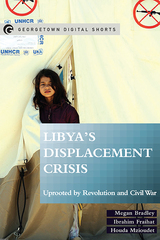
Libya faces a bleak humanitarian crisis, the result of the country’s descent into civil war in the summer of 2014 following the 2011 revolution.
Hundreds of thousands of Libyan citizens are uprooted within the country and many more are sheltering in neighboring states, particularly Tunisia. Drawing on in-depth interviews with policymakers, practitioners, and displaced Libyans both inside and outside the country, Megan Bradley, Ibrahim Fraihat, and Houda Mzioudet present a brief, yet thoroughly illuminating assessment of the political, socioeconomic, security, humanitarian, and human rights implications of the continued displacement of Libyan citizens within and outside their country.
Assessing the complex dimensions and consequences of the situation, Libya’s Displacement Crisis lays the groundwork for what comes next. Acknowledging that the resolution of this crisis hinges on a negotiated end to the Libyan civil war, the authors present ideas to improve assistance strategies and to support durable solutions for displaced Libyans with implications for refugee crises in other parts of the world, including Syria and Iraq.
Georgetown Digital Shorts—longer than an article, shorter than a book—deliver timely works of peer-reviewed scholarship in a fast-paced, agile environment. They present new ideas and original texts that are easily and widely available to students, scholars, libraries, and general readers.

In this comprehensive study of psychology, theology, and religious experience the author asserts that psychology and religion can faithfully complement one another, even when the psychology in question is primarily grounded in Freudian analysis.

An authoritative introduction to bioethics, Life Choices examines a comprehensive range of ethical questions and brings together some of the most probing and instructive essays published in the field.
Some of the articles are classics in the literature of bioethics, while others address current issues. Topics include moral decision making, abortion, euthanasia and assisted suicide, life-sustaining technologies, organ transplantation, reproductive technologies, and the allocation of health care resources.
This second edition features new sections on the goals and allocation of medicine and on the cloning of human beings. It also includes new articles on genetics, the duty to die, and ethical theory.
Written by the foremost authorities in bioethics, Life Choices provides a comprehensive introduction to the field. Instructors who have used the first edition as a text will welcome this new, updated edition. Scholars and health care practitioners will find it useful as a valuable reference on a wide range of bioethical issues.
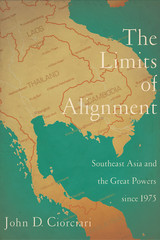
The Limits of Alignment is an engaging and accessible study that explores how small states and middle powers of Southeast Asia ensure their security in a world where they are overshadowed by greater powers. John D. Ciorciari challenges a central concept in international relations theory—that states respond to insecurity by either balancing against their principal foes, “bandwagoning” with them, or declaring themselves neutral. Instead, he shows that developing countries prefer limited alignments that steer between strict neutrality and formal alliances to obtain the fruits of security cooperation without the perils of undue dependency.
Ciorciari also shows how structural and normative shifts following the end of the Cold War and the advent of U.S. primacy have increased the prevalence of limited alignments in the developing world and that these can often place constraints on U.S. foreign policy. Finally, he discusses how limited alignments in the developing world may affect the future course of international security as China and other rising powers gather influence on the world stage.

Michael Hayes offers a vigorous defense of incrementalism: the theory that the policymaking process typically should involve bargaining, delay, compromise, and, therefore, incremental change. Incrementalism, he argues, is one result of a checks-and-balances system in which politicians may disagree over what we want to achieve as a nation or what policies would best achieve shared goals.
Many political scientists have called for reforms that would facilitate majority rule and more radical policy change by strengthening the presidency at the expense of Congress. But Hayes develops policy typologies and analyzes case studies to show that the policy process works best when it conforms to the tenets of incrementalism. He contends that because humans are fallible, politics should work through social processes to achieve limited ends and to ameliorate—rather than completely solve—social problems. Analyzing the evolution of air pollution policy, the failure of President Clinton’s health care reform in 1994, and the successful effort at welfare reform in 1995-96, Hayes calls for changes that would make incrementalism work better by encouraging a more balanced struggle among social interests and by requiring political outcomes to conform to the rule of law.
Written for students and specialists in politics, public policy, and public administration, The Limits of Policy Change examines in detail a central issue in democratic theory.
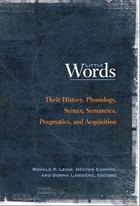
Little Words is an interdisciplinary examination of the functions and change in the use of clitics, pronouns, determiners, conjunctions, discourse particles, auxiliary/light verbs, prepositions, and other “little words” that have played a central role in linguistic theory and in language acquisition research. Leading scholars present advanced research in phonology, morphology, syntax, semantics, discourse function, historical development, variation, and acquisition by children and adults.
This unique volume integrates the views and findings of these different research areas into one professional source to be used within and across disciplines. Languages studied include English, Spanish, French, Romanian, German, Norwegian, Swedish, Slavonic, and Medieval Leonese.
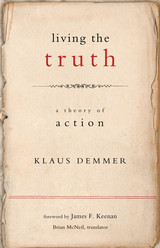
How is moral theology related to pastoral theology? In this first English translation of Living the Truth, Klaus Demmer answers this question by offering a complete theory of action. Its crucial element is truthfulness, which Demmer claims is a basic attitude that must be translated concretely into our individual decisions. Demmer demonstrates that the demand for truthfulness offers a critical corrective to the usual praxis whereby ethical norms are formulated. This has significant consequences for every area of ethical directives, including questions about celibacy and partnerships.
Demmer moves away from the act-centered morality that dominates the neo-Scholastic manuals of moral theology. His concern is to show how our actions embody and carry out a more original anthropological project. Not only does this anthropological project condition our insights into goods and values, it provides the criteria by which our actions are judged morally. This book will be welcomed by all who are looking for ethical norms, and by all whose task it is to formulate such norms.

Today organized interests fight most of their major battles within coalitions. Whether joining forces to address tobacco legislation or proposed air safety regulations, Washington lobbyists with seemingly little in common are combining their clout to get results.
Kevin Hula here examines why coalition strategies have emerged as a dominant lobbying technique, when lobbyists use them, and how these strategies affect their activities. His is the first book to focus on the formation and use of coalitions by lobbyists, examining the broader scope of interest group coalitions and explaining their roles as institutions of collective leadership, bargaining, and strategy for member organizations.
Combining collective action theory with data gleaned from 130 interviews with lobbyists and interest group leaders in the fields of transportation, education, and civil rights, Hula explores how the use of coalitions differs at various stages of the policy process and with different activities. In the course of his study, he also shows how the communications revolution is changing interest group tactics.
The single most detailed work available on this subject, Lobbying Together offers scholars and students alike a fresh and accessible look at this increasingly important factor in the policy process.
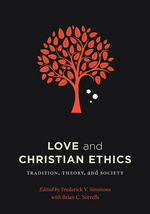
At the heart of Christian ethics is the biblical commandment to love God and to love one's neighbor as oneself. But what is the meaning of love? Scholars have wrestled with this question since the recording of the Christian gospels, and in recent decades teachers and students of Christian ethics have engaged in vigorous debates about appropriate interpretations and implications of this critical norm.
In Love and Christian Ethics, nearly two dozen leading experts analyze and assess the meaning of love from a wide range of perspectives. Chapters are organized into three areas: influential sources and exponents of Western Christian thought about the ethical significance of love, perennial theoretical questions attending that consideration, and the implications of Christian love for important social realities. Contributors bring a richness of thought and experience to deliver unprecedentedly broad and rigorous analysis of this central tenet of Christian ethics and faith. William Werpehowski provides an afterword on future trajectories for this research. Love and Christian Ethics is sure to become a benchmark resource in the field.

eTextbooks are now available through VitalSource.com!
Called "a major innovator in his art form" by The New York Times, Baghdad-born poet Abdul Wahab Al-Bayati broke with over fifteen centuries of Arabic poetic tradition to write in free verse and became world famous in the process. Love, Death, and Exile: Poems Translated from Arabic is a rare, bilingual facing-page edition in both the original Arabic text and a highly praised English translation by Bassam K. Frangieh, containing selections from eight of Al-Bayati's books of poetry.
Forced to spend much of his life in exile from his native Iraq, Al-Bayati created poetry that is not only revolutionary and political, but also steeped in mysticism and allusion, moving and full of longing. This collection is a superb introduction to Al-Bayati, Arabic language, and Arabic literature and culture as well.
On Al-Bayati's death in 1999, The New York Times obituary quoted him as saying once that his many years of absence from his homeland had been a "tormenting experience" that had great impact on his poetry. "I always dream at night that I am in Iraq and hear its heart beating and smell its fragrance carried by the wind, especially after midnight when it's quiet."

Although the two great commandments to love God and to love our neighbors as ourselves are central to Christianity, few theologians or spiritual writers have undertaken an extensive account of the meaning and forms of these loves. Most accounts, in fact, make love of God and love of self either impossible or immoral. Integrating these two commandments, Edward Vacek, SJ, develops an original account of love as the theological foundation for Christian ethics.
Vacek criticizes common understandings of agape, eros, and philia, examining the arguments of Aquinas, Nygren, Outka, Rahner, Scheler, and other theologians and philosophers. He defines love as an emotional, affirmative participation in the beloved's real and ideal goodness, and he extends this definition to the love between God and self. Vacek proposes that the heart of Christian moral life is loving cooperation with God in a mutually perfecting friendship.

Loyal Dissent is the candid and inspiring story of a Catholic priest and theologian who, despite being stripped of his right to teach as a Catholic theologian by the Vatican, remains committed to the Catholic Church. Over a nearly fifty-year career, Charles E. Curran has distinguished himself as the most well-known and the most controversial Catholic moral theologian in the United States. On occasion, he has disagreed with official church teachings on subjects such as contraception, homosexuality, divorce, abortion, moral norms, and the role played by the hierarchical teaching office in moral matters. Throughout, however, Curran has remained a committed Catholic, a priest working for the reform of a pilgrim church. His positions, he insists, are always in accord with the best understanding of Catholic theology and always dedicated to the good of the church.
In 1986, years of clashes with church authorities finally culminated in a decision by the Congregation for the Doctrine of the Faith, headed by then-Cardinal Josef Ratzinger, that Curran was neither suitable nor eligible to be a professor of Catholic theology. As a result of that Vatican condemnation, he was fired from his teaching position at Catholic University of America and, since then, no Catholic university has been willing to hire him. Yet Curran continues to defend the possibility of legitimate dissent from those teachings of the Catholic faith—not core or central to it—that are outside the realm of infallibility. In word and deed, he has worked in support of more academic freedom in Catholic higher education and for a structural change in the church that would increase the role of the Catholic community—from local churches and parishes to all the baptized people of God.
In this poignant and passionate memoir, Curran recounts his remarkable story from his early years as a compliant, pre-Vatican II Catholic through decades of teaching and writing and a transformation that has brought him today to be recognized as a leader of progressive Catholicism throughout the world.
READERS
Browse our collection.
PUBLISHERS
See BiblioVault's publisher services.
STUDENT SERVICES
Files for college accessibility offices.
UChicago Accessibility Resources
home | accessibility | search | about | contact us
BiblioVault ® 2001 - 2024
The University of Chicago Press









